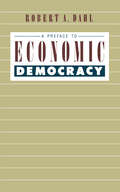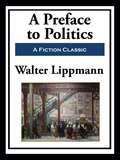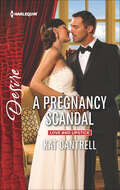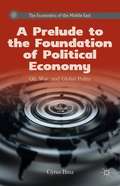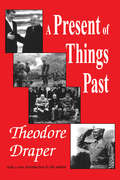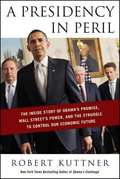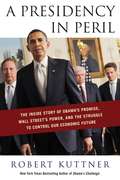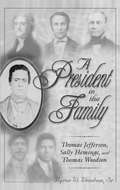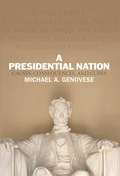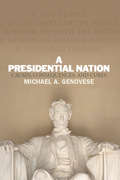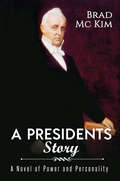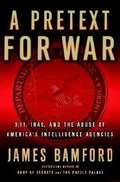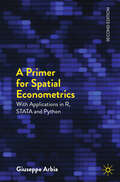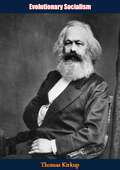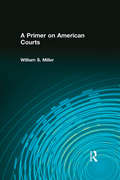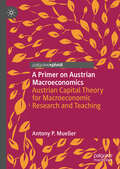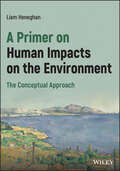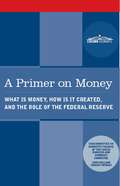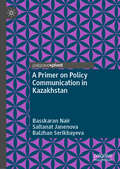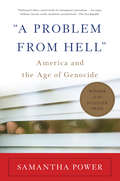- Table View
- List View
A Preface to Economic Democracy (Quantum Books #28)
by Robert A. DahlTocqueville pessimistically predicted that liberty and equality would be incompatible ideas. Robert Dahl, author of the classic A Preface to Democratic Theory, explores this alleged conflict, particularly in modern American society where differences in ownership and control of corporate enterprises create inequalities in resources among Americans that in turn generate inequality among them as citizens.Arguing that Americans have misconceived the relation between democracy, private property, and the economic order, the author contends that we can achieve a society of real democracy and political equality without sacrificing liberty by extending democratic principles into the economic order. Although enterprise control by workers violates many conventional political and ideological assumptions of corporate capitalism as well as of state socialism. Dahl presents an empirically informed and philosophically acute defense of "workplace democracy." He argues, in the light of experiences here and abroad, that an economic system of worker-owned and worker-controlled enterprises could provide a much better foundation for democracy, political equality, and liberty than does our present system of corporate capitalism.
A Preface to Politics
by Walter LippmannThe most incisive comment on politics to day is indifference. When men and women begin to feel that elections and legislatures do not matter very much, that politics is a rather distant and unimportant exercise, the reformer might as well put to himself a few searching doubts. Indifference is a criticism that cuts beneath oppositions and wranglings by calling the political method itself into question. Leaders in public affairs recognize this. They know that no attack is so disastrous as silence, that no invective is so blasting as the wise and indulgent smile of the people who do not care. I have put forward a preliminary sketch for a theory of politics, a preface to thinking. Like all speculation about human affairs, it is the result of a grapple with problems as they appear in the experience of one man. For though a personal vision may at times assume an eloquent and universal language, it is well never to forget that all philosophies are the language of particular men.
A Pregnancy Scandal: A Pregnancy Scandal Redeeming The Billionaire Seal Trapped With The Maverick Millionaire (Love and Lipstick #2)
by Kat CantrellThey married for the sake of the baby. Will they stay together for love? Widowed power player Phillip Edgewood's political ambitions demand he have a wife-they don't demand he love her. It's a good thing, too, because his heart belongs to the perfect wife he lost. But finding a woman who will say "I do" to his deal proves difficult. Until he meets Alexandra Meer-the sexy CFO he can't resist. She doesn't believe in happily-ever-after, even after their amazing night together. And now she's pregnant with his child! A marriage of convenience should end the scandal and solve all their problems...as long as they don't fall in love...
A Prelude to the Foundation of Political Economy
by Cyrus BinaA Prelude to the Foundation of Political Economy is a groundbreaking volume of theory and strategy on political economy and polity of the twenty-first century. Distilled in concrete terms, it elucidates the enigma of oil in view of the centrality of global social relations.
A Present of Things Past: Selected Essays
by Theodore DraperTheodore Draper is one of America's most trenchant and informed critics. A Present of Things Past gathers together ten of his most recent and most powerful selected essays, in which Draper, with his customary acuity and wit, tackles a host of issues that define America's political culture. A Present of Things Past is concerned with a reexamination of the Second World War in both its military and its political aspects; the trajectory of American conservatism as it manifested itself during the Reagan years; the rise of Gorbachev and the history of "reform" in the Soviet Union; the revisionist debate over the origins and history of American communism; and the persistent mystery of a man named Max Eitingon, who was, depending on one's reading of the sources, either an important figure in the history of psychoanalysis or an agent of the Soviet secret police, or both. In "American Hubris," Draper illuminates the assumptions that have guided American foreign policy in the postwar period, and concludes that our costly misadventures--in Korea, Vietnam, Lebanon, and elsewhere--cannot be considered a string of aberrations. They were, he argues, a consequence of the Truman Doctrine. In "Reagan's Junta," Draper observes: "This is supposed to have been the era of the imperial presidency. It has turned out to be the era of presidencies that have tried to make themselves imperial-and failed." Throughout these compelling essays, Draper demonstrates the uses and abuses to which history has been put by ideologues of both the left and the right. He finds unacceptable, for example, the practice of many journalists of fictionalizing their sources. The New York Times has called Draper "one of the clearer-eyed observers of the issues that torment us." A Present of Things Past enhances that reputation.
A Presidency in Peril
by Robert KuttnerAs with many progressives who had pinned their hopes on the promise of Barack Obama, Kuttner (co-editor of The American Prospect magazine) has become disappointed with President Obama's failure to deliver transformational change in the realm of US economic policy. He delivers a work of reportage, analysis, and critique that seeks to understand the reasons for Obama's basic acquiescence to the priorities of Wall Street over those of Main Street and his failure to push for strong financial regulation in the face of economic crisis. Although he is critical of Obama's economic performance in the first two years, he holds out hope that the President may yet salvage his legacy and offers advice on how Obama could go about redeeming his presidency. Annotation ©2010 Book News, Inc. , Portland, OR (booknews. com)
A Presidency in Peril: The Inside Story of Obama's Promise, Wall Street's Power, and the Struggle to Control Our Economic Future
by Robert KuttnerAs with many progressives who had pinned their hopes on the promise of Barack Obama, Kuttner (co-editor of The American Prospect magazine) has become disappointed with President Obama's failure to deliver transformational change in the realm of US economic policy. He delivers a work of reportage, analysis, and critique that seeks to understand the reasons for Obama's basic acquiescence to the priorities of Wall Street over those of Main Street and his failure to push for strong financial regulation in the face of economic crisis. Although he is critical of Obama's economic performance in the first two years, he holds out hope that the President may yet salvage his legacy and offers advice on how Obama could go about redeeming his presidency. Annotation ©2010 Book News, Inc. , Portland, OR (booknews. com)
A President in the Family: Thomas Jefferson, Sally Hemings, and Thomas Woodson
by Byron W. WoodsonThe author, a 6th generation descendant of Jefferson, details the quest to corroborate family lore, locate missing family members, and reveal the truth about life at Monticello.
A Presidential Nation
by Michael A. GenoveseThe Washington Monument, the Lincoln Memorial, the Jefferson Memorial. Why do we devote monuments to the presidents? Why do we honor them, instead of Congress, or the courts?A Presidential Nationexamines how the presidency-an office limited by the Constitution and separation of powers-became the centerpiece of American government. Michael A. Genovese argues that in rebelling against the British, the Framers of the Constitution invented a circumscribed presidency to guard against executive tyranny. Yet, over time, presidential power has risen and congressional power declined to a point where the United States has a near imperial presidency. Reexamining the status of presidential power in the post-9/11 world, Dr. Genovese considers the alternatives, if any, to the current model of presidential power. A Presidential Nationis perfect for students of American Presidency and Federal Governance courses and anyone interested in the changing authority of the American political system.
A Presidential Nation
by Michael A. GenoveseThe Washington Monument, the Lincoln Memorial, the Jefferson Memorial. Why do we devote monuments to the presidents? Why do we honor them, instead of Congress, or the courts? A Presidential Nation examines how the presidency--an office limited by the Constitution and separation of powers--became the centerpiece of American government. Michael A. Genovese argues that in rebelling against the British, the Framers of the Constitution invented a circumscribed presidency to guard against executive tyranny. Yet, over time, presidential power has risen and congressional power declined to a point where the United States has a near imperial presidency. Reexamining the status of presidential power in the post-9/11 world, Dr. Genovese considers the alternatives, if any, to the current model of presidential power. A Presidential Nation is perfect for students of American Presidency and Federal Governance courses and anyone interested in the changing authority of the American political system.
A Presidential Nation
by Michael A. GenoveseThe Washington Monument, the Lincoln Memorial, the Jefferson Memorial. Why do we devote monuments to the presidents? Why do we honor them, instead of Congress, or the courts? A Presidential Nation examines how the presidency--an office limited by the Constitution and separation of powers--became the centerpiece of American government. Michael A. Genovese argues that in rebelling against the British, the Framers of the Constitution invented a circumscribed presidency to guard against executive tyranny. Yet, over time, presidential power has risen and congressional power declined to a point where the United States has a near imperial presidency. Reexamining the status of presidential power in the post-9/11 world, Dr. Genovese considers the alternatives, if any, to the current model of presidential power. A Presidential Nation is perfect for students of American Presidency and Federal Governance courses and anyone interested in the changing authority of the American political system.
A Presidential Nation: Causes, Consequences, and Cures
by Michael A. GenoveseThe Washington Monument, the Lincoln Memorial, the Jefferson Memorial. Why do we devote monuments to the presidents? Why do we honor them, instead of Congress, or the courts? A Presidential Nation examines how the presidency?an office limited by the Constitution and separation of powers?became the centerpiece of American government. Michael A. Genovese argues that in rebelling against the British, the Framers of the Constitution invented a circumscribed presidency to guard against executive tyranny. Yet, over time, presidential power has risen and congressional power declined to a point where the United States has a near imperial presidency. Reexamining the status of presidential power in the post-9/11 world, Dr. Genovese considers the alternatives, if any, to the current model of presidential power. A Presidential Nation is perfect for students of American Presidency and Federal Governance courses and anyone interested in the changing authority of the American political system.
A Presidents Story
by Brad McKimAt the dawn of the 19th century, fourteen men will succeed George Washington in leading the young United States. As their personal tales intertwine and overlap with one another on their way to the Presidency, they craft an election system that is, at once, chaotic and orderly. Their ambition forces them to join political parties even as those parties’ agendas are not always clear. Their supporters engage in ever more vicious public and private campaigns. They rely on political favors and a partisan press to win votes and to solicit compromise. And yet, they follow Washington’s example and hand over power after each election to the newest victor, typically with unprecedented grace and humility. These are the practices that survive, even as a Civil War looms that threatens to destroy virtually everything else about the young country.
A Pretext for War: 9/11, Iraq, and the Abuse of America's Intelligence Agencies
by James BamfordInA Pretext for War, acclaimed author James Bamford-whose classic bookThe Puzzle Palacefirst revealed the existence of the National Security Agency-draws on his unparalleled access to top intelligence sources to produce a devastating expose of the intelligence community and the Bush administration. A Pretext for War reveals the systematic weaknesses behind the failure to detect or prevent the 9/11 attacks, and details the Bush administration's subsequent misuse of intelligence to sell preemptive war to the American people. Filled with unprecedented new revelations, from the sites of "undisclosed locations" to the actual sources of America's Middle East policy, A Pretext for War is essential reading for anyone concerned about the security of the United States.
A Primer for Spatial Econometrics: With Applications in R, STATA and Python (Palgrave Texts in Econometrics)
by Giuseppe ArbiaThis textbook offers a practical and engaging introduction to spatial econometric modelling, detailing the key models, methodologies and tools required to successfully apply a spatial approach. The second edition contains new methodological developments, new references and new software routines in R that have emerged since the first edition published in 2014. It also extends practical applications with the use of the software STATA and of the programming language Python. The first software is used increasingly by many economists, applied econometricians and social scientists while the software Python is becoming the elective choice in many scientific applications. With new statistical appendices in R, STATA and Python, as well as worked examples, learning questions, exercises and technical definitions, this is a significantly expanded second edition that will be a valuable resource for advanced students of econometrics.
A Primer of Socialism
by Thomas KirkupThis book is a concise and authoritative introduction to the principles, history, and prospects of socialism, written by one of the leading British economists and statisticians of the early 20th century. Kirkup explains the key concepts and debates of socialist theory and practice, from utopian visions to scientific socialism, from cooperatives to nationalization, from Marx to Bernstein. The book is a lucid and engaging guide to one of the most influential and controversial movements in modern politics and society.-Print ed.
A Primer on American Courts
by William MillerThis brief, accessible, and inexpensive supplement on American courts and their functions provides undergraduate, or first-year law students, with an understanding of the key substantive and procedural concepts that they need to know to study the law or the judicial process. Recognizing that there are many substantive and procedural concepts about American courts that students must first grasp in order to study the law or the judicial process, this brief text answers important questions about justiciability, standing, jurisdiction, and judicial power. With a stronger historical context, this text is a perfect complement to a text on Constitutional Law, Judicial Process, or a legal casebook, and will help students master the legal vocabulary with which they are confronted.
A Primer on Austrian Macroeconomics: Austrian Capital Theory for Macroeconomic Research and Teaching (Palgrave Studies in Austrian Economics)
by Antony P. MuellerThis book offers an accessible framework for macroeconomic modelling rooted in the capital theory of Austrian Economics. By distinguishing between the goods and monetary sides of the economy and exploring their interaction, the book provides a comprehensive macroeconomic model that integrates time preference and interest rates. It examines how monetary and fiscal policies can produce business cycles and how these cycles are influenced by central bank liquidity and financial market behaviour. Additionally, the book discusses the ways in which monetary and fiscal policies can prolong and intensify economic stagnation. Through its clear exposition, this book deepens the understanding of the conditions that determine the unsustainability of credit-driven economic expansions. It is essential reading for students and researchers in political economy, macroeconomics, monetary economics, and those interested in advancing Austrian Economics.
A Primer on Fiscal Analysis in Oil-Producing Countries
by Paulo Medas Daria ZakharovaA report from the International Monetary Fund.
A Primer on Human Impacts on the Environment: The Conceptual Approach
by Liam HeneghanA Primer on Human Impacts on the Environment An insightful and illuminating discussion of the impact humans have had on Earth In A Primer on Human Impacts on the Environment: The Conceptual Approach, distinguished environmental scientist Liam Heneghan explores the intricate relationships between humanity and Earth in an accessible and engaging style. Replete with real-world examples and drawing from classic and contemporary scholarship, the author adapts the fundamental conceptual models of the environmental disciplines to assess the risks human beings are taking with their home planet. The conceptual approach of this primer challenges readers to think across multiple disciplines to reveal the “big picture” that is all too often lost in the details of contemporary environmental studies. Readers will also find: A thorough introduction to conceptual modeling, showing how systems models can be adapted and applied in a rapidly changing world Comprehensive explorations of the human impact on the Earth, including an examination of possible ecological limits and planetary boundaries In-depth evaluations of environmental risks, especially, though not limited to, climate change and biodiversity loss A guide to contemplating catastrophic risk and the potential for societal collapse without inducing unnecessary anxiety An interdisciplinary focus, emphasizing the role of the natural and social sciences, as well as the arts and humanistic disciplines in safeguarding the future Perfect for students of environmental science and environmental studies, A Primer on Human Impacts on the Environment will also earn a place in the libraries of graduate students working on environmental themes and practicing professionals in the environmental management community.
A Primer on Money
by Subcommittee on Domestic FinanceThe above quote was from a 1941 speech by U.S. congressman Wright Patman, a fierce critic of the Federal Reserve. A Primer on Money, released in 1964 by the Congressional Subcommittee on domestic finance, explains in Patman’s introduction “in simple, everyday language how the US monetary system works and indicates where it needs reform.” It describes specifically: - What is money? - How is money created? - The role of the Federal Reserve System - Money supply and Monetary policy - Improvements in the Money System Although this publication is over fifty years old and changes have been made to the Federal Reserve System since then, it is a testament to Patman’s insights that this report is still relevant and important to today’s discussion about the role of the Federal Reserve in the U.S. economy. This report is essential reading for students of monetary policy, academics, policymakers, journalists, and anyone interested in learning about the basics of money and the Federal Reserve.
A Primer on Policy Communication in Kazakhstan
by Basskaran Nair Saltanat Janenova Balzhan SerikbayevaThis book is a timely publication to address the issue of the government’s policy execution capabilities. The crux of policy execution is communication to win the hearts and minds of the people, particularly with regard to complex policies. The book is written as a work manual based on international policy communication best practices and principles, interwoven with case studies from Kazakhstan, applicable in other Central Asian countries as well. The book’s wide range of topics cover media management in a technologically-savvy society, marketing of complexity, planning successful campaigns, soft power management given the country’s aspirations for greater international standing, and forward-looking advice on crisis management and shareholder communication. This is a highly relevant book for the civil service, civic organisations, commercial entities, policy researchers, and international organisations working in or planning to work in Kazakhstan and other Central Asian countries.
A Princess of the Chameln (The Rulers of Hylor #1)
by Cherry WilderTHE CHAMELN ARE AN ANCIENT PEOPLE of the continent of Hylor who live in a wide and beautiful land of lakes, grassland and forest. They are ruled by a double sovereignty, chosen always from two families, the Firn and the Zor. Aidris Am Firn, her father's heir, learns the traditional skills and duties of a princess. But powerful forces are threatening the rulers of the Chameln. The parents of Aidris are assassinated and her own life is in danger. When Esher Am Zor, the remaining ruler, dies, the warlike neighboring state of Mel'Nir invades the Chameln lands and the princess must go swiftly into exile to avoid capture. Aidris is practical and well-schooled. She does what she has to do to survive, though it means leaving friends and comforts behind. A secret journey through the forest and the need to fend for herself and an unexpected companion harden her determination. When, in the moment of greatest danger, a splendid champion appears, she still does not reveal her identity. Through long years Aidris keeps her secret and leads the life of a cavalry soldier, a kedran, in the peaceful realm of Athron. She has strange adventures and hears strange tales; she experiences love and friendship. Aidris comes to terms with her own royal heritage and learns to work her own magic. All this is in preparation for the day her people throw off the yoke of Mel'Nir and come for her. And when this day does come she is able to face the difficult life of a queen, in war and in peace.
A Privilege to Die: Inside Hezbollah's Legions and Their Endless War Against Israel
by Thanassis CambanisWhile Hamas and Al Qaeda are certainly dangerous to Israel and the West, Hezbollah and its millions of foot soldiers are the premier force in the Middle East. Veteran Middle East correspondent Thanassis Cambanis offers the first detailed look at the surprising cross section of people willing to die for Hezbollah and its uncompromising agenda to remake the map of the region and destroy Israel.Part standing army, part political party, and part theological movement, Hezbollah is made up not just of unemployed young men but also middle-class engineers, merchants, even nurses. Hezbollah's widespread popularity rests on its ability to offer its followers economic reform, affordable health care, dependable electricity, efficient courts, and safe streets, as well as victory over Israel. Also unique to the party is its powerful doctrine of self-improvement, which challenges its members to fight ignorance, make money, and engage in safe sex. Millions of demoralized Middle Easterners have gravitated toward these principles, swelling the ranks of what is at heart a radical, militant group. They span economic class, include both fanatics and casual believers, and are sworn to the apocalyptic beliefs of the "Party of God." With its promise of perpetual war, Hezbollah has ushered in a militant renaissance and inspired fighters in Gaza, the West Bank, Egypt, Iraq, and beyond. Whatever their differences, their hatred of Israel and the United States binds them together. To understand Hezbollah is to understand the fighters and engineers, the women who raise the martyrs, the scouts who plant trees, and the nine-year-old girls who take the veil over the objections of their less militant fathers. Cambanis follows a few Hezbollah families through the ups and downs of the 2006 war with Israel and the continuing preparations for another conflict, letting us listen in to Hezbollah members' intimate discussions at the kitchen table and on the battlefield. Cambanis's reporting puts a human face on the Party of God, so we might understand the ideological and religious roots of today's conflict. His riveting narrative provides an urgent and important exploration of militancy in the Middle East.Praise for A PRIVILEGE TO DIE
A Problem From Hell: American and the Age of Genocide
by Samantha Power<P>In 1993, as a 23-year-old correspondent covering the wars in the Balkans, I was initially comforted by the roar of NATO planes flying overhead. <P>President Clinton and other western leaders had sent the planes to monitor the Bosnian war, which had killed almost 200,000 civilians. But it soon became clear that NATO was unwilling to target those engaged in brutal "ethnic cleansing. " American statesmen described Bosnia as "a problem from hell," and for three and a half years refused to invest the diplomatic and military capital needed to stop the murder of innocents. <P> In Rwanda, around the same time, some 800,000 Tutsi and opposition Hutu were exterminated in the swiftest killing spree of the twentieth century. Again, the United States failed to intervene. This time U. S. policy-makers avoided labeling events "genocide" and spearheaded the withdrawal of UN peacekeepers stationed in Rwanda who might have stopped the massacres underway. <P>Whatever America's commitment to Holocaust remembrance (embodied in the presence of the Holocaust Museum on the Mall in Washington, D. C. ), the United States has never intervened to stop genocide. This book is an effort to understand why. <P> While the history of America's response to genocide is not an uplifting one, "A Problem from Hell" tells the stories of countless Americans who took seriously the slogan of "never again" and tried to secure American intervention. Only by understanding the reasons for their small successes and colossal failures can we understand what we as a country, and we as citizens, could have done to stop the most savage crimes of the last century. -Samantha <P><P> <B>Pulitzer Prize Winner</B>
